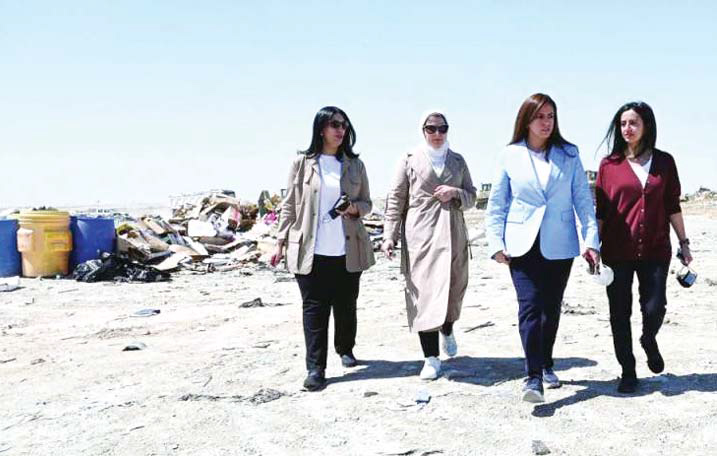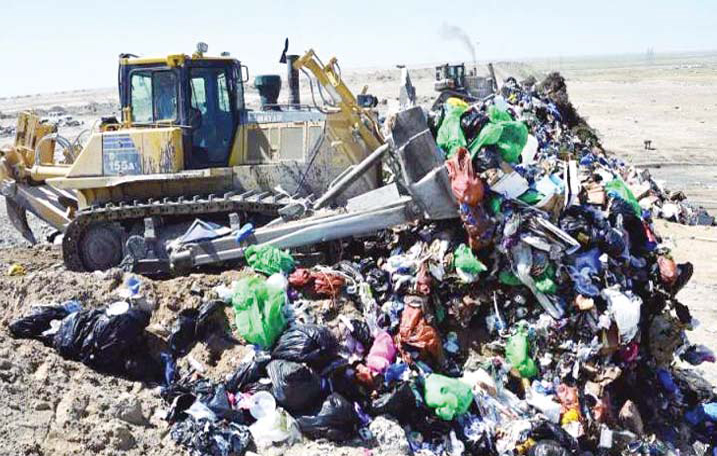28/03/2023
28/03/2023
KUWAIT CITY, March 29: A field tour conducted by the members of the Municipal Council’s Environmental Affairs Committee at the waste and asbestos dumping sites in Mina Abdullah and Shuaiba areas recently revealed an unsatisfactory situation, reports Al-Rai daily. This situation entails a new environmental disaster that will negatively affect the air, water and soil as well as the population, in the event that things remain as they are and the environmental authorities do not come together to deal with it and solve it.

The reports issued by the Environment Public Authority (EPA) described the environmental situation in Kuwait’s landfills as “highly dangerous” due to the volume of gases emitted from those landfills. In this regard, the Chairperson of the committee Eng. Alia Al-Farsi stressed the need to work towards generating electric power by using the technology of incinerators with international technical and environmental specifications, in addition to converting waste into RDF-produced fuel, fertilizers, and other waste treatment methods. She insisted that the approach must be serious about these projects, announcing that the fourth structural plan identified the sites designated for solid waste management to establish treatment sites at these sites in the future. In a statement issued on the sidelines of the tour, Eng. Al-Farsi affirmed that the committee’s strategy is in line with EPA to limit some waste dumping sites, and to work on converting them into treatment sites, as well as to work on treating and rehabilitating existing landfills, and restoring their lands.

Waste
She said the aim of the visit was to benefit from waste and residues in accordance with the terms of reference of the Kuwait Municipality and to keep pace with future urban development, especially since the landfill site in Mina Abdullah is one of the operating landfills with an area of about two million square meters and receives municipal waste (solid, household, agricultural, commercial, miscellaneous, sand and non-hazardous industrial waste.
Furthermore, a member of the environmental committee Eng. Munira Al-Amir said, “The tour offered a closer look at the real situation of landfills, and to know the mechanisms used in the collection, sorting, backfilling and recycling process. It also revealed all the details to ensure that our legislative decisions are compatible with the real solution, for what we see on the ground. We also observed the shortcomings, especially in terms of urban cleanliness, which is one of the first concerns because of its great impact on the environment and human health. I took several steps to help develop the hygiene file in general, as I submitted many questions that were discussed during the parliamentary sessions. I also submitted two proposals, one of which was approved by the parliament, and by the minister, and a decision was issued, which is the use of expert offices to develop technical foundations for cleaning contracts, setting control standards, and cost levels, with an emphasis on the need for national cadres to work along with this advisory team throughout the study period to receive expertise from them.
As for the other proposal, it is related to the classification of cleaning companies and a review of the tenders and mechanisms for offering these works to get out of the current situation. It will be discussed in the council committees to make the right decision in this regard.” She highlighted the reality of the current situation in landfills, which requires attention, adding, “Unfortunately, it is not reassuring, especially after the recent reports issued by EPA about the volume of gases emitted from landfills, including the Mina Abdullah landfill where a high-risk impact on air, water and soil was observed. This will in turn affect the population because of the emissions emanating from it, which requires prompt action on the authority’s part as well as by MPs, the Environmental Affairs Committee, and everyone who has a role in this regard.”
Also, the committee member Eng. Farah Al- Roumi said, “During the tour, the waste collection and sorting mechanism was reviewed, along with the size or area of the available landfills, their compatibility with nature, and the quantity of waste. The amount of waste that is received at the Mina Abdullah landfill is about 2,500 tons per day.” She explained that the current situation in landfills will be assessed to determine the needs and solutions required to enact appropriate regulations and laws.
Cleanliness
The council is in the process of preparing a new regulation for cleanliness. Therefore, a shift must be made from the system currently used in landfill sites for the disposal of municipal solid waste by replacing it with a modern environmental system for waste treatment, recycling, and reducing the waste of large areas used for backfilling.
The Shuaiba site is used for asbestos waste (hazardous waste), which is asbestos fibers. The site was handed over to the municipality in 2016, and the municipality operates and manages it according to the directives of EPA. Article 8 of the environment law No. 42/2014 obliges the concerned authorities to make a complete inventory of the types, quantities, and locations of asbestos waste in the country, within a period of 5 years from the date of issuance of the law, and to dispose of these hazardous wastes in a qualified site.
In addition, Eng. Munira Al-Amir revealed that the Municipal Council is currently working on issuing a new hygiene regulation that will contribute to the development of an integrated work system for the disposal of various wastes, to develop the status quo as quickly as possible through the use of modern technology for sorting and recycling. She urged the national cadres and the private sector to be part of this system and save the natural resources from exposure to further pollution. Eng. Al-Amir affirmed her confidence that all concerned parties in the hygiene file will work to provide all means of cooperation required to solve this crisis as quickly as possible and with the required effectiveness.


